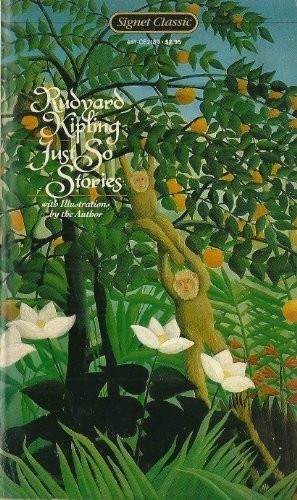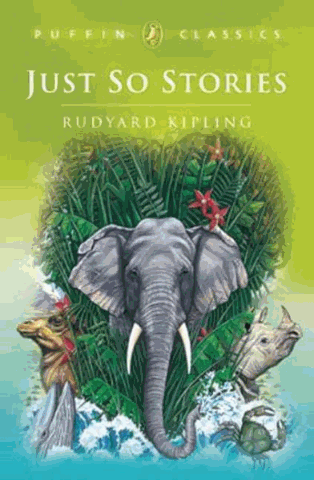
Nine short stories, which must always be told "just so," in order that the sleepy child listening will not have to put back missing sentences. The stories are about animals, and many explain possible origins of their features, as How the Leopard Got His Spots.
year: 1972, 1987, 2009, 1996, 1974, 1991, 1982, 2002, 2008, 1986, 2004, 2010, 2001, 1912, 1992, 2013, 1952, 1978, 1946, 1994, 1980, 1965, 1907, 2018, 2012
call number/section: 1000, 398, 398.2, 808.81, 808.8
subjects: children's stories, english, animals, fiction, short stories, juvenile fiction, audiobooks, ward, helen, illus,, tall tales, children's stories, short stories, electronic books
Editions

Kipling, Rudyard
Doubleday (1972)
Twelve stories about animals, insects, and other subjects include "How the Alphabet Was Made," "How the Camel Got His Hump," and "The Elephant's Child.".
Schools: 0

Kipling, Rudyard
H. Holt (1987)
Twelve stories about animals, insects, and other subjects, including "How the Aphabet Was Made," "How the Camel Got His Hump," and "The Elephant's Child.".
Schools: 2

Kipling, Rudyard
Chartwell Books (2009)
Contains stories explaining why the camel has a hump, why the rhino's wrinkly skin does not fit, why leopards have spots, why elephants have trunks, and other mysteries.
Schools: 0

Kipling, Rudyard
W. Morrow (1996)
A collection of stories about animals, explaining such mysteries as why camels, leopards, elephants, and armadillos look the way they do.
Schools: 3

Kipling, Rudyard
New American Library (1974)
Schools: 1

Kipling, Rudyard
HarperCollins (1991)
A collection of the well-known stories, including "How the Whale Got His Throat, " "The Elephant's Child, " and "The Butterfly that Stamped.".
Schools: 3

Kipling, Rudyard
R. McNally (1982)
Schools: 1

Kipling, Rudyard
Signet Classic (2002)
Twelve stories about animals, insects, and other subjects include "How the Whale Got His Throat," "The Elephant's Child," "How the Alphabet Was Made," and "The Butterfly that Stamped.".
Schools: 8

Kipling, Rudyard
Puffin (2008)
A collection of twelve fables and short stories by Rudyard Kipling including "How the Whale got his Throat" and "The Elephant's Child.".
Schools: 1

Kipling, Rudyard
Silver Burdett (1986)
Schools: 0

Kipling, Rudyard
Puffin (2004)
A collection of the well-known stories, including "How the Whale Got His Throat, " "The Elephant's Child, " and "The Butterfly that Stamped.".
Schools: 0

Kipling, Rudyard
Phoenix Audio (2010)
A collection of stories about animals, explaining such mysteries as why camels, leopards, elephants, and armadillos look the way they do.
Schools: 1

Kipling, Rudyard
Border Press (2001)
Schools: 0

Kipling, Rudyard
Doubleday (1912)
A collection of twelve humorous tales including how the rhinoceros got his skin and the leopard got his spots.
Schools: 6

Kipling, Rudyard
Distributed by Random House (1992)
A collection of the well-known stories, including "How the Whale Got His Throat," "The Elephant's Child," and "The Butterfly That Stamped.".
Schools: 0

Kipling, Rudyard
A collection of stories about animals, explaining such mysteries as why camels, leopards, elephants, and armadillos look the way they do.
Schools: 0

Kipling, Rudyard
Palazzo (2013)
An illustrated collection of stories about animals, insects, and other subjects, including "How the Whale Got His Throat," "The Elephant's Child," "How the Alphabet Was Made," and "The Butterfly that Stamped.".
Schools: 1
Kipling, Rudyard
Garden City Books (1952)
Twelve short stories, most of which tell how such things as the alphabet, the camel's hump, and the elephant's trunk came to be.
Schools: 0
Kipling, Rudyard
Weathervane Books (1978)
Schools: 0
Kipling, Rudyard
Schools: 0
Kipling, Rudyard
Garden City Books (1952)
Twelve short stories, most of which tell how such things as the alphabet, the camel's hump, and the elephant's trunk came to be.
Schools: 0
Kipling, Rud
Schools: 0
Kipling, Rudyard
Schools: 0
Kipling, Rudyard
Doubleday (1946)
A collection of twelve stories which tell how certain things came to be, including How the Alphabet Was Made, How the Camel Got His Hump, and How the Leopard Got His Spots.
Schools: 0
Kipling, Rudyard
Doubleday (1952)
Twelve short stories, most of which tell how such things as the alphabet, the camel's hump, and the elephant's trunk came to be.
Schools: 0
Kipling, Rudyard
Penguin (1994)
Just So Stories creates the enchantment of the beginning of the world when animals could talk and think like people.
Schools: 0
Kipling, Rudyard
Weathervane Books (1978)
Schools: 0
Kipling, Rudyard
Schools: 0
Kipling, Rudyard
Watermill Press (1980)
Schools: 0
Kipling, Rudyard
Doubleday (1952)
Twelve short stories, most of which tell how such things as the alphabet, the camel's hump, and the elephant's trunk came to be.
Schools: 0
Kipling, Rudyard
Grosset & Dunlap (1965)
Nine short stories, which must always be told "just so," in order that the sleepy child listening will not have to put back missing sentences. The stories are about animals, and many explain possible origins of their features, as How the Leopard Got His Spots.
Schools: 0
Kipling, Rudyard
Doubleday (1907)
Schools: 0
Kipling, Rudyard
Doubleday (1907)
Schools: 0
Kipling, Rudyard
Doubleday (1907)
Schools: 0
Kipling, Rudyard
Doubleday (1907)
Schools: 0
Kipling, Rudyard
Doubleday (1946)
A collection of twelve stories which tell how certain things came to be, including How the Alphabet Was Made, How the Camel Got His Hump, and How the Leopard Got His Spots.
Schools: 0
Kipling, Rudyard
Schools: 0

Kipling, Rudyard
Palazzo (2018)
An illustrated collection of stories about animals, insects, and other subjects, including "How the Whale Got His Throat," "The Elephant's Child," "How the Alphabet Was Made," and "The Butterfly that Stamped.".
Schools: 1
Kipling, Rudyard
Twelve stories about animals and insects including How the Camel Got His Hump; How the First Letter was Written, and How the Rhinoceros Got His Skin.
Schools: 0

Kipling, Rudyard
Schools: 2
Kipling, Rudyard
Doubleday (1946)
A collection of twelve stories which tell how certain things came to be, including How the Alphabet Was Made, How the Camel Got His Hump, and How the Leopard Got His Spots.
Schools: 0
Kipling, Rudyard
Penguin (1994)
Just So Stories creates the enchantment of the beginning of the world when animals could talk and think like people.
Schools: 0
Kipling, Rudyard
Twelve short stories, most of which tell how such things as the alphabet, the camel's hump, and the elephant's trunk came to be.
Schools: 0
Kipling, Rudyard
Twelve short stories, most of which tell how such things as the alphabet, the camel's hump, and the elephant's trunk came to be.
Schools: 0
Kipling, Rudyard
Schools: 1
Kipling, Rudyard
Schools: 0
Kipling, Rudyard
Mackin Educational Resources (2012)
Twelve stories about animals, insects, and other subjects include "How the Whale Got His Throat," "The Elephant's Child," "How the Alphabet Was Made," and "The Butterfly that Stamped.".
Schools: 1